Beth Buelow's Blog, page 6
August 3, 2016
Ep124: The Power of Podcasting as a Platform for Introverts
About The Episode
 Whenever I go to a conference, I consider it a productive use of my time if I come away with at least one idea that I’m excited to implement. That’s exactly what happened when I attended Podcast Movement in early July, just about a month ago. You heard some one of those ideas in Episode 122, when I spoke with attendees at a meet-up I co-hosted with friend Dave Stachowiack. While I was in Chicago, I tracked down three of my fellow podcasters who self-identified as introverts. Each of them has a very different type of podcast and format, and each offers advice if you’re interested in starting your own show. The advice they give goes for almost any type of content you want to create, whether that’s a blog, book, video series, or podcast. We also chat about where they see their introversion playing a role in their approach to podcasting.
Whenever I go to a conference, I consider it a productive use of my time if I come away with at least one idea that I’m excited to implement. That’s exactly what happened when I attended Podcast Movement in early July, just about a month ago. You heard some one of those ideas in Episode 122, when I spoke with attendees at a meet-up I co-hosted with friend Dave Stachowiack. While I was in Chicago, I tracked down three of my fellow podcasters who self-identified as introverts. Each of them has a very different type of podcast and format, and each offers advice if you’re interested in starting your own show. The advice they give goes for almost any type of content you want to create, whether that’s a blog, book, video series, or podcast. We also chat about where they see their introversion playing a role in their approach to podcasting.
In between each of these three short interviews, I offer you some questions to think about when it comes to your own podcast or content creation.
Connect with the Podcasters

With Ginger, co-host of The Outlander
Ginger, host of The Outlander Podcast: http://www.outlanderpod.com/, https://itunes.apple.com/us/podcast/the-outlander-podcast/id707360955
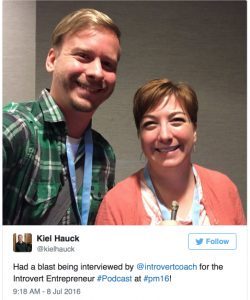 Kiel Hauck, host of Chat with the Experts (Angie’s List): https://www.angieslist.com/articles/chat-experts-podcast.htm, https://itunes.apple.com/us/podcast/chat-experts-home-lifestyle/id738632926
Kiel Hauck, host of Chat with the Experts (Angie’s List): https://www.angieslist.com/articles/chat-experts-podcast.htm, https://itunes.apple.com/us/podcast/chat-experts-home-lifestyle/id738632926
It’s All Dead https://itsalldead.com/, https://itunes.apple.com/us/podcast/its-all-dead-podcast/id737519403
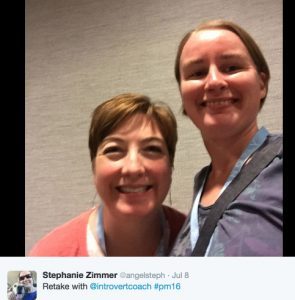 Stephanie Zimmer, host of TV Rewind: http://tvrewindpodcast.com/, https://itunes.apple.com/us/podcast/tv-rewind-podcast/id393160801
Stephanie Zimmer, host of TV Rewind: http://tvrewindpodcast.com/, https://itunes.apple.com/us/podcast/tv-rewind-podcast/id393160801
Resources About Podcasting
Podcast Movement
iTunes Podcast FAQ
How to Launch and Grow a Podcast to 1,000,000 Downloads
Why a Comprehensive Content Strategy Includes Podcasting
Want to start a podcast? Take advice from these 4 podcasting pros
The Podcasters’ Studio (Gear)
The Introvert Entrepreneur Mastermind Groups
Virtual Book Group Registration for “The Introvert Entrepreneur“
Podcast and Content Creation Questions for Your Consideration
Whether it’s a podcast, blog, book, video or some other platform, these are all questions that can help you find your focus and move forward.
Where do you notice a lot of conversation happening among your peers?
Around which topics does there seem to be high energy or a resurgence of interest? And do you have any strong feelings about those topics? Or you have a driving curiosity that makes you want to dig into the topic with others.
In the spirit of Ginger’s advice to experiment, do you have any desire to push the envelope, be a contrarian or take some risks around the topic and your ideas on it?
Does it feel like something you’d be willing to stick your neck out for?
And are you open to trying different ways of expressing yourself?
What are all of the possible topics you feel you could speak regularly about, while feeling consistent enthusiasm for the message?
Which ones support your business goals?
Which ones would just feel good to express?
Where do you already have expertise, and where would you feel comfortable building your expertise as you go?
As you think about the format you want to use to share your message, what suits it best?
Is it your sharing solo?
Do you bring in other people as guests?
What would it be like to have a co-host, or in the case of a book or blog, a co-author?
Would it strengthen or dilute your brand?
If You Enjoyed the Show
You can subscribe to The Introvert Entrepreneur Podcast on on iTunes or Stitcher. Please leave an honest review on iTunes or Stitcher. If you want to hear more news from The Introvert Entrepreneur including and beyond the podcasts, join the enewsletter mailing list.
*Amazon links are affiliate, meaning I receive a few pennies when you purchase through my link. You get some retail therapy, I get additional resources to keep bringing you great podcasts. Win-Win!!
The post Ep124: The Power of Podcasting as a Platform for Introverts appeared first on The Introvert Entrepreneur.
July 14, 2016
Ep123: Andy Buelow on Being an Introvert Nonprofit Leader
About Andy Buelow
 Andy Buelow is a highly experienced nonprofit executive whose focus has been within the orchestra industry for over 30 years. His career path started as a telemarketer for the Milwaukee Symphony Orchestra, selling season tickets for their year-round performances. He has served as the Executive Director the Traverse Symphony Orchestra (MI) and is currently in that position with the Tacoma Symphony Orchestra (WA). He earned a B.A. from Lawrence University in Appleton, Wisconsin, and has a great affinity towards the Midwestern U.S.
Andy Buelow is a highly experienced nonprofit executive whose focus has been within the orchestra industry for over 30 years. His career path started as a telemarketer for the Milwaukee Symphony Orchestra, selling season tickets for their year-round performances. He has served as the Executive Director the Traverse Symphony Orchestra (MI) and is currently in that position with the Tacoma Symphony Orchestra (WA). He earned a B.A. from Lawrence University in Appleton, Wisconsin, and has a great affinity towards the Midwestern U.S.
Key Conversation Points
The similarities between how entrepreneurs and non-profit organizations work with people cultivate relationships
Staying true to your energy needs in the workplace
Examining the challenges specific to the nonprofit world
How to learn from other professionals you work with
Why introverts excel at sales, contrary to popular belief
The power of passion for what you do and how to leverage it
Connect with Andy
Andy’s Introvert Island Book Selections
The Book of Common Prayer
The Holy Bible (NRSV)
The Lord of the Rings | J.R.R. Tolkien
Sharing is Caring!
This week, my husband, Andy, joins me in sharing #introvert insight. #Podcast via @IntrovertCoach
The parallels between #entrepreneurship and nonprofits. #Podcast via @IntrovertCoach
What you can learn from working with a boss you can’t stand. #Podcast via @IntrovertCoach
Join us this week on vacation in #introvert cabin! #Podcast via @IntrovertCoach
Why the nonprofit sector and #introversion are a match made in heaven. #Podcast via @IntrovertCoach
If You Enjoyed the Show
You can subscribe to The Introvert Entrepreneur Podcast on on iTunes or Stitcher. Please leave an honest review on iTunes or Stitcher. If you want to hear more news from The Introvert Entrepreneur including and beyond the podcasts, join the enewsletter mailing list.
*Amazon links are affiliate, meaning I receive a few pennies when you purchase through my link. You get some retail therapy, I get additional resources to keep bringing you great podcasts. Win-Win!!
The post Ep123: Andy Buelow on Being an Introvert Nonprofit Leader appeared first on The Introvert Entrepreneur.
July 8, 2016
Ep122: Introverts in the Wild
“Anthropologist Victor Turner writes that we are most free to explore identity in places outside of our normal routines, places that are in some way ‘betwixt and between.’ Turner calls them liminal, from the Latin word for ‘threshold.'”
― Sherry Turkle, Alone Together: Why We Expect More from Technology and Less from Each Other

Part of the group who met up with us in Chicago!
In a slight departure from other episodes, I’m playing the role of an introvert anthropologist. The context? This week is Podcast Movement, a conference for podcasters that offers oodles of ideas, inspiration, and connection. My friend, Dave Stachowiak of Coaching for Leaders, invited me to co-host an informal meetup here in Chicago during the conference. We met last night in the middle of a downpour on Michigan Avenue. Our refuge was Panera Bread, and that’s where I asked attendees if I could do impromptu interviews with them. To my delight, they all agreed!
This episode is titled “Introverts in the Wild” because it’s spontaneous, unscripted, and informal. You’ll meet nine people, most introverts, who each share a slice of their story and what inspires them. You’ll also hear the sounds of the wild by way of other people in the space, so this is more reporter-on-the-street than sterile studio sound.
I hope you enjoy listening as much as I enjoyed interviewing them!
(PS: Let me know what you think of this episode at beth @ theintrovertentrepreneur.com … I’m experimenting and mixing things up a bit, all in the spirit of creating a stronger podcast experience for you. I’d love to hear from you!)
The post Ep122: Introverts in the Wild appeared first on The Introvert Entrepreneur.
June 29, 2016
Ep121: 14 Counter-Intuitive Ways to Build Your Business
Resources Mentioned
Chicago 7/7/16 Meetup with Beth Buelow and Dave Stachowiak (Coaching for Leaders podcast host)
Podcast Movement
The Introvert Entrepreneur (Book)
Virtual Book Groups
The Introvert Entrepreneur Mastermind GroupsBrené Brown
“Revenge of the Introvert” by Laurie Helgoe, Psychology Today
The Blogcast
 There’s no shortage of advice on how you “should” build your business. Common sense, “you should do this” advice can be useful in the beginning. At some point, however, things start to shift, and what worked on day one doesn’t work on day 1,000.
There’s no shortage of advice on how you “should” build your business. Common sense, “you should do this” advice can be useful in the beginning. At some point, however, things start to shift, and what worked on day one doesn’t work on day 1,000.
Remember that 1994 episode of Seinfeld, “The Opposite,” when George decides to do the exact opposite of what his instincts were telling him (and it worked)? Well, we’re going to embark on our own journey of opposites, exploring a few business development ideas that turn conventional wisdom on its head.
Be vulnerable
Never let them see you sweat, right? Choosing vulnerability in business doesn’t mean baring our souls or opening ourselves up to attack. It does mean that we give ourselves space to be human. According to author and vulnerability researcher Brené Brown, vulnerability is the heart of relationship and connection. She defines it as “uncertainty, risk and emotional exposure.” Sounds a bit like entrepreneurship to me!
TIP: As you allow for vulnerability in a healthy way, you’ll form deeper connections with your clients. People do business with people, not perfection. A little sweat never killed anyone.
Promote your competition
Unless your ideal customers are women named Iris who were born on December 5th in a leap year, chances are high that there are tens of thousands — if not millions — of people who would be a good match for your business. How can one person possibility serve them all? How can hundreds? Rather than see your similarly-niched peers as competition, see them as colleagues. Release any scarcity mentality and recognize that there’s enough for everyone.
TIP: Swap blog posts, podcast interviews and articles; share their posts and tweets; and trust that your voice is different enough that you’ll attract exactly the right people to you.
Limit social media
Social media is both the best gift to introverts and entrepreneurs and the biggest time waster ever invented. We tend to place a lot of emphasis on our online presence, sometimes to the detriment of our off-line relationship building. It can be tempting to lean on social media – and by extension email and texting – for all of our communication, instead of picking up the phone or meeting for coffee. We also fail to recognize that even if we’ve spent an entire day “alone,” but have been active on social media, we haven’t been alone. We’ve engaged in social interaction to a degree that exceeds most in-person events. The constant information flow and virtual conversations can be as energetically exhausting as the average networking event.
TIP: Use social media strategically — as a catalyst for in-person connection — rather than see it as an end in itself. Resist the bright shiny social media objects that enter your orbit almost every day. Stick to the strategy and platforms that give you the most return. It’s a great way to pace yourself and connect with anywhere from one to thousands of people on your own terms, with just a click, but be mindful of when it’s serving as a substitute for human contact.
Don’t sell
If you’re an entrepreneur, you’re in sales. What the best sales people know is that the sales process isn’t about the financial transaction we often get stuck around (money issues, anyone?). It’s about listening, curiosity, and educating. After that, it’s about problem solving, influencing, and making another person’s life a little easier. Few people enjoy being sold to, but everyone appreciates and remembers the person who listened to them.
TIP: Let go of “making the sale” and exchange it with sincere curiosity. Invite others to learn about your solution. If it’s the right fit, the sale will happen without any hard sell at all.
Make it easy for people to say “no”
Do you define your ideal client as “anyone with a pulse?” Are you worried that if you limit your market, you’ll leave out countless people that you could help? If so, you’re wasting precious time, energy and resources trying to be all things to all people (and thereby being little-to-nothing for anyone). Ideally, prospective customers will visit your website, scan your social media, or read your blog, and they’ll quickly feel a resonance or dissonance with you.
TIP: Give people clear information that makes it easy to self-select in or out. This way, you’ll spend most of your resources on your ideal prospects and convert more of them to customers.
Don’t betray your excitement
One of my coaching colleagues has a memorable way of making this point: be the “hot girl” at the dance. The hot girl knows she’s hot — she doesn’t follow people around hoping someone will throw her a bone. So play it cool when you receive an inquiry. It’s a fine line between professional enthusiasm and over-the-top flattery: one cultivates a peer-to-peer relationship, the other smacks of desperation.
TIP: Show genuine interest and gratitude, but refrain from gushing about how you’d be “thrilled,” “super excited,” or “absolutely love” to work with someone. Be enthusiastic, but avoid an over-the-top tone.
Don’t reply too quickly
Do you check your email, voicemail, blog comments or social media every few minutes? And then, at the first sign of life, do you jump to respond? At 2 a.m.? On a Sunday night? Stop the madness! Responding immediately to communications, day and night, sends a message that you have nothing more productive to do than wait for the notification “ding” to ring.
TIP: Establish some healthy, professional boundaries around your time, and don’t train people to expect you to be responsive 24/7 (unless that’s your business model).
Focus on one-to-one
When I’m coaching my introvert clients, we often talk about getting the most bang for our energetic buck when reaching out to people. We look for highly efficient, one-to-many communication strategies. And yet, while it’s much more labor intensive to meet with people one-to-one, it can actually yield higher return. Why? Because you’re being very specific with those conversations, focusing on mutual champions with whom you have a strong synergy. And champions don’t keep the good news to themselves. They tell two friends, then they tell two friends, and so on, and so on.
TIP: Identify five champions and commit to a conversation in the next month. Exchange information that makes it easy to spread the word about each other’s businesses.
Focus on one-to-many
Yes, I’m contradicting myself, but this is a both/and situation, not an either/or. When it comes to the services you provide, one-to-one isn’t necessarily the best model for an introvert entrepreneur. We can quickly burn out if we’re only reaching one person at a time with our work, especially if the model equates to trading time for money. And as an introvert, I see time as energy, so that means I’m trading energy for money, and that’s only sustainable if I find efficient ways to do it. This is one reason why I balance my one-on-one coaching schedule with one-to-many revenue generating activities such as podcasting, writing, virtual book groups, masterminds, and public speaking.
TIP: If your revenue generating activities primarily happen one-to-one, look at additional ways you can serve a larger audience. In addition to the ways I just mentioned such as writing or public speaking, you can teach online classes, offer webinars, conduct in-person trainings, or create passive income through downloadable information products on your website. Find inspiration through a bit of research on the websites of your colleagues to see what their business model looks like.
Release expectations of success
Setting specific goals is an integral part of any business strategy. However, we can become very attached to those goals, thinking that they are the true and only definition of success. Then every move we make becomes a win or loss, good or bad. We end up judging each experience (and ourselves), rather than learning from it. I’ll take this opportunity to share my favorite guiding mantra: I’m open to outcome, not attached.
TIP: Be open to a range of outcomes. Some will be better than you can imagine, most not nearly as terrible as you dread. Release attachment to exactly how you’ll get there or what it will look like. A magical thing happens when you release strict expectations: failure evaporates, and you’re left with valuable information.
Have a beginner’s mind
As entrepreneurs, we’re expected to be experts in our chosen field. But many times, we might be only a few steps ahead of our clients. To keep that edge and confidence, we must keep learning. We must be willing to be the student, to have a beginner’s mind, even about things that we feel like we know inside and out. Otherwise, we become complacent and eventually irrelevant.
TIP: Take refresher courses, attend workshops and conferences, and read the latest books with the same curiosity you had when you were just starting out. Innovation happens when we set aside what we think we know and see things with fresh eyes.
Give it away
We can gather a lot of information and build our lists by offering certain products or services for free for a limited time. You might be thinking, “But what about the revenue we’ll be missing? Don’t people value what they pay for?” It’s true: we’ll be sacrificing some revenue, and people won’t be as invested in our business. That said, when done intentionally, strategically and for a carefully selected period of time, giving it away expands our reach and allows for idea testing.
TIP: Make sure each give-away is appealing to potential buyers and ideal clients, not just people who love free stuff. Free should serve as an easy point-of-entry into doing business with you.
Don’t give it away
Wait, didn’t you just say to give it away? Yes. But if we do it for too long, without a clear plan, we condition the market to expect it for free. We inevitably undermine the value of what we — and by extension, our peers — have to offer. We respect ourselves, our business, and our customers when we provide ample opportunities for a mutual exchange of value.
TIP: Believe, with no room for doubt, in the value of your offer. People will surprise you by stepping up and responding to your confidence with their commitment.
Stop shaming your comfort zone
I’m closing this post with what might be the most counter-intuitive statement of all. So I’m going to spend a bit more time unpacking this idea than I did the other ones.
Google the words “comfort zone,” and the vast majority of results are all about getting out, stepping out, and crushing it. Over time, particularly in our Type A, high achieving, go-big-or-go-home culture, the idea of being in one’s “comfort zone” has been maligned and shamed. It’s seen as a place of stagnation and sloth. It’s certainly not a place where highly successful people hang out for very long, if at all.
Forgive my language, but I call BS. Our comfort zone plays a powerful role (especially for introverts) in our sustainability and happiness as entrepreneurs, leaders, colleagues, and friends.
The true definition of comfort zone is “a place or situation where one feels safe or at ease and without stress.” For the introvert entrepreneur, our comfort zone is both a soft landing and a launching pad. I see value in honoring our comfort zone from two perspectives: it’s where we recharge, and it’s where we find our footing.
Our Fuel-Up Station
Our comfort zone is our recharging station. It’s where we replenish our energy. There’s space for bold ideas and new connections to take root and grow. Why? Because we’re not over-stimulated by the stress we feel when we are in unfamiliar territory. There’s a sense of freedom in our comfort zone. We’re not on high alert and can be alone with our thoughts, things, people, and places that feel like home. With the energy and ideas that are born in our comfort zone, we can then stretch without breaking.
Your recharging station is anywhere you feel free and relaxed. It might entail walking in the woods, staring at the water, spending time with pets, exercising, meditating, coloring, journaling, daydreaming or even napping. In our go-go-go world, these nourishing activities often take a backseat to being “productive.” My experience? I come up with my best ideas and amplify my courage when I’m in my personal comfort zone, minus the distractions, stress, and silly societal pressure to “go big or go back to bed.”
Our Launching Pad
It’s where we find our footing and take those baby steps everyone always says are so important. Here’s an example: you want to start a blog, knowing it’ll be a great way to engage with your clients and customers. So many questions, though! What platform to use, how often to post, what topics to write about, where to promote it, how to engage your readers… depending on your strengths, the entire endeavor can be way outside your comfort zone. It’s easy to become paralyzed by the discomfort and confusion. So the “start blogging” to-do item is recycled week to week, month to month.
This is where the comfort zone is your friend. Without the external “you should be doing this” messaging, there’s space to ask: what are you most comfortable with? What’s a reasonable, set-yourself-up-for-success baby step? It might be researching platforms. You could brainstorm a list of topics, without censoring or thinking about the details. Many people find comfort in structure, so you could set some simple parameters: one post, 300 words, 60 minutes, one main point to make or piece of information to share, write with one person in mind (preferably your ideal reader). Remember: you don’t have to tell your life story, cover every possible angle, or write the next Pulitzer Prize-winning article. By stripping the activity down to its essence and temporarily suspending your emotional attachment to an outcome, you can increase comfort enough to break the paralysis.
When it comes baby steps, I find comfort and inspiration in the words of St. Francis of Assisi: “Start by doing what’s necessary; then do what’s possible; and suddenly you are doing the impossible.”
A New Language
Perhaps if we refer to our comfort zone as “home base,” “base camp,” or a “rest stop,” it would remind us of the healthy necessity of spending time there. We would never go on a journey without taking timeouts to rest and refuel, so why do we send out messages that if you’re not “going big” or “living on the edge” all the time, you’re taking up space?
This does not mean we should avoid any and all situations that bring us fear, stress, or discomfort. The comfort zone should be part of the journey, not the final destination. However, we will experience more success in those stretch situations if we’ve first honored our introvert need to recharge and take baby steps within the quiet and friendly confines of our comfort zone.
…
As entrepreneurs, we always have to question the status quo. As Christopher Reeve put it, “Never accept ultimatums, conventional wisdom, or absolutes.” Take advice and “common knowledge” with a grain of salt. Sit with it long enough to draw your own conclusion. Learn to listen to your intuition, especially if it’s counter to everyone else.
If You Enjoyed the Show
You can subscribe to The Introvert Entrepreneur Podcast on on iTunes or Stitcher. Please leave an honest review on iTunes or Stitcher. If you want to hear more news from The Introvert Entrepreneur including and beyond the podcasts, join the enewsletter mailing list.
The post Ep121: 14 Counter-Intuitive Ways to Build Your Business appeared first on The Introvert Entrepreneur.
June 22, 2016
Ep120: Cate Brubaker Shares About Creating a Location-Independent Business
About Cate Brubaker
 Cate Brubaker has over 15 years experience in international education as a teacher, intercultural trainer, and program developer. Originally from Oregon, Cate lived in Germany for nearly four years, and has worked and traveled throughout the US, Europe, the Caribbean, and Latin America. She was a Carolina Navigator for two years while writing her dissertation on intercultural learning during short-term study abroad, and enjoyed visiting schools all across North Carolina. In addition to consulting and teaching for UNC, she is co-authoring a book about K-12 teachers’ intercultural experiences in the classroom, and runs a website for intercultural educators called SmallPlanetStudio.com.
Cate Brubaker has over 15 years experience in international education as a teacher, intercultural trainer, and program developer. Originally from Oregon, Cate lived in Germany for nearly four years, and has worked and traveled throughout the US, Europe, the Caribbean, and Latin America. She was a Carolina Navigator for two years while writing her dissertation on intercultural learning during short-term study abroad, and enjoyed visiting schools all across North Carolina. In addition to consulting and teaching for UNC, she is co-authoring a book about K-12 teachers’ intercultural experiences in the classroom, and runs a website for intercultural educators called SmallPlanetStudio.com.
Key Conversation Points
The ramifications of coming home after living abroad for an extended period
The internal experience of travel and how it translates to others
Recognizing and addressing “reverse culture shock” after traveling abroad
Relaunching yourself after coming home
Location independence for entrepreneurs
The pros and cons of “workcations”
Being fully present and mindful during your excursions
Misconceptions concerning workcations involving very little actual work
Being respectful and curious about other cultures
Resources Mentioned in the Podcast
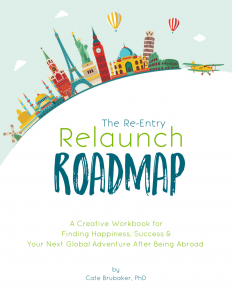 Re-entry Relaunch Roadmap
Re-entry Relaunch Roadmap
July Chicago Meetup with Dave Stachowiak
The Introvert Entrepreneur Virtual Book Groups
The Introvert Entrepreneur Mastermind Groups
Betsy and Warren Talbot
Connect with Cate
Website
Twitter
Facebook Group
Cate’s Introvert Island Book Selections*
Any book by Margaret Atwood (I chose to share my two favorites: A Handmaid’s Tale and Alias Grace. ~BB)
A Journal (I picked a fun travel-friendly journal from Moleskine. ~BB)
A German Cookbook (For your consideration: German Cuisine: Authentic German Cooking for the Home Chef)
Sharing is Caring!
Are you an #entrepreneur seeking location independence? #Podcast via @IntrovertCoach @CateBrubaker
Discover the benefits of being semi-nomadic. #Podcast via @IntrovertCoach @CateBrubaker
Learn the secret to productive #business “workcations.” #Podcast via @IntrovertCoach @CateBrubaker
How to recalibrate after working abroad for an extended period. #Podcast via @IntrovertCoach @CateBrubaker
If You Enjoyed the Show
You can subscribe to The Introvert Entrepreneur Podcast on on iTunes or Stitcher. Please leave an honest review on iTunes or Stitcher. If you want to hear more news from The Introvert Entrepreneur including and beyond the podcasts, join the enewsletter mailing list.
*Amazon links are affiliate, meaning I receive a few pennies when you purchase through my link. You get some retail therapy, I get additional resources to keep bringing you great podcasts. Win-Win!
The post Ep120: Cate Brubaker Shares About Creating a Location-Independent Business appeared first on The Introvert Entrepreneur.
June 16, 2016
Ep119: Fred Mandell on the Intersection of Business and Creativity
About Fred Mandell
 Fred Mandell has earned a reputation as a highly innovative business leader, author, widely collected sculptor and painter and leadership provocateur. He has helped thousands of individuals and their organizations internationally to develop their creative skills and enhance their personal and professional growth. In 2014, Fred launched the not for profit organization The Global Institute for the Arts and Leadership (TGIAL.) Its mission is to create a more peaceful, sustainable and beautiful world by developing positive, transformational leaders through the arts worldwide. Fred also currently teaches the highly rated arts based program at MIT Sloan School of Management entitled “The Leader as Artist.”During his 21 year career at American Express Financial Advisors, Fred built the top sales division in the company. He went on to become the first sales leader in the 100-year history of the firm to run an investment company, which grew to over $3.5 billion under management, posting consecutive years of record earnings on his watch.
Fred Mandell has earned a reputation as a highly innovative business leader, author, widely collected sculptor and painter and leadership provocateur. He has helped thousands of individuals and their organizations internationally to develop their creative skills and enhance their personal and professional growth. In 2014, Fred launched the not for profit organization The Global Institute for the Arts and Leadership (TGIAL.) Its mission is to create a more peaceful, sustainable and beautiful world by developing positive, transformational leaders through the arts worldwide. Fred also currently teaches the highly rated arts based program at MIT Sloan School of Management entitled “The Leader as Artist.”During his 21 year career at American Express Financial Advisors, Fred built the top sales division in the company. He went on to become the first sales leader in the 100-year history of the firm to run an investment company, which grew to over $3.5 billion under management, posting consecutive years of record earnings on his watch.
Key Conversation Points
Accepting and appreciating your introverted nature
Appreciating the value of an introvert’s reflection when applied to teams
Using new media analysis and understanding of introversion as a catalyst to raise awareness
Discovering the blueprint for converting introverted to extroverted behaviors
Reflecting on personal and professional transformation
The connection between creativity, art and leadership
Functioning effectively in unfamiliar terrain
Periodically reassessing your goals for yourself, your business and your community
Learning how to adapt and thrive when facing the unknown
Leaving fear behind and integrating new approaches and ideas
Resources Mentioned in the Podcast*
The Global Institute for The Arts and Leadership
Becoming a Life Change Artist: 7 Creative Skills to Reinvent Yourself at Any Stage of Life | Fred Mandell
Can Art Save Us? | Fred Mandell
Upcoming Virtual Book Groups for “The Introvert Entrepreneur”
Information about The Introvert Entrepreneur Mastermind Groups
The Artist’s Way | Julia Cameron
Coloring books by Jenean Morrison
Big Magic | Elizabeth Gilbert
Anything by Anne Lamott
Connect with Fred
Fred’s Introvert Island Book Selections*
The Hero’s Journey | Joseph Campbell
Daniel Deronda | George Eliot
The Book of Ecclesiastes (I chose to link specifically to The Wisdom Books: Job, Proverbs and Ecclesiastes: A Translation with Commentary by Robert Alter. ~BB)
Sharing is Caring!
How can art can make you a better #leader? #Podcast via @IntrovertCoach @famandell
The future of #business is humanitarian. Find out why! #Podcast via @IntrovertCoach @famandell
Are you ready to discover (or rediscover) your calling? #Podcast via @IntrovertCoach @famandell
How honing self-awareness can only help your #business. #Podcast via @IntrovertCoach @famandell
If You Enjoyed the Show
You can subscribe to The Introvert Entrepreneur Podcast on on iTunes or Stitcher. Please leave an honest review on iTunes or Stitcher. If you want to hear more news from The Introvert Entrepreneur including and beyond the podcasts, join the enewsletter mailing list.
*Amazon links are affiliate, meaning I receive a few pennies when you purchase through my link. You get some retail therapy, I get additional resources to keep bringing you great podcasts. Win-Win!!
The post Ep119: Fred Mandell on the Intersection of Business and Creativity appeared first on The Introvert Entrepreneur.
June 8, 2016
Ep118: Nancy Ancowitz on the Art of Self-Promotion for Introverts
Special Note About This Episode
This is a special episode because it comes from “the vault,” the archived episodes of The Introvert Entrepreneur Podcast. The conversation from August 2010 is with Nancy Ancowitz, author of “Self-Promotion for Introverts®”. I chose it because the topic of self-promotion comes up time and time again… learning how to do it better never goes out of style! New episodes will resume with #119, so stay tuned…
About Nancy
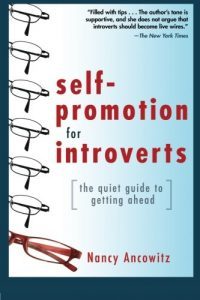 Nancy Ancowitz is a coach specializing in career advancement and presentation skills and author of Self-Promotion for Introverts®: The Quiet Guide to Getting Ahead (McGraw-Hill), a Publishers Weekly “best book” selection, which has been translated into multiple languages. The book offers a gentle, but results oriented, approach to helping those who talk less get heard more.
Nancy Ancowitz is a coach specializing in career advancement and presentation skills and author of Self-Promotion for Introverts®: The Quiet Guide to Getting Ahead (McGraw-Hill), a Publishers Weekly “best book” selection, which has been translated into multiple languages. The book offers a gentle, but results oriented, approach to helping those who talk less get heard more.
She is an adjunct instructor at New York University, where she teaches Presentation Skills for Introverts®, Self-Promotion for Introverts®, public speaking, business writing, and other communication skills; she’s also spoken at the Smithsonian Institution, the US Navy, the National Institutes of Health, New York Life, the Institute for Supply Management, and a wide range of other corporate and professional organizations. Nancy blogs for Psychology Today and Salary.com, and she has written for The New York Times and The Wall Street Journal online.
Connect with Nancy
Website
Psychology Today Blog
Facebook
Twitter
Buy “Self-Promotion for Introverts”
If You Enjoyed the Show
You can subscribe to The Introvert Entrepreneur Podcast on on iTunes or Stitcher. Please leave an honest review on iTunes or Stitcher. If you want to hear more news from The Introvert Entrepreneur including and beyond the podcasts, join the enewsletter mailing list.
*Amazon links are affiliate, meaning I receive a few pennies when you purchase through my link. You get some retail therapy, I get additional resources to keep bringing you great podcasts. Win-Win!!
The post Ep118: Nancy Ancowitz on the Art of Self-Promotion for Introverts appeared first on The Introvert Entrepreneur.
May 25, 2016
Ep117: Melissa Wadsworth Gives Small Talk Tips for Introverts
Special Note About This Episode
This is a special episode because it comes from “the vault,” the archived episodes of The Introvert Entrepreneur Podcast. Melissa was my guest back in March 2011. She offered such wonderful and timeless advice about small talk, I thought it was a perfect episode to share during a period in which I’m doing some future planning for the podcast. I mention a bit about the intention behind this brief visit to the vault in the introduction to this episode. And below, I share the questions I’m using to conduct a self-evaluation. The end result? A better podcast experience for you and for me!
About Melissa
 Melissa Wadsworth is a change catalyst, certified dream coach, law of attraction and dream board expert, creative intuitive, speaker, and author. Her vision and leadership integrate her own transformational life lessons, innate optimism, and her commitment to bringing healing change energy to the world.
Melissa Wadsworth is a change catalyst, certified dream coach, law of attraction and dream board expert, creative intuitive, speaker, and author. Her vision and leadership integrate her own transformational life lessons, innate optimism, and her commitment to bringing healing change energy to the world.
The founder of Brilliance Unlimited, LLC, Melissa has dedicated her life to exploring consciousness, creativity, and communications in order to support people worldwide in the manifestation of amazing life journeys. Her methods offer a radical shift and uplift for people who feel trapped by the status quo or an unbalanced life, and who desire insight into their unique life blueprint and essence.
Her first book, Small Talk Savvy (Kindle title: The Small Talk Handbook), was based on communications expertise that came from a fifteen-year public relations career, and her own growth as a introvert finding her authentic voice. Seattle is Melissa’s home community.
Connect with Melissa
Website
Collective Manifestation
Facebook
Collective Manifestation book*
The Small Talk Handbook* (formerly Small Talk Savvy)
Project Process Check/Self-Evaluation Questions
These are questions I’m asking myself as I reflect and plan for the future. Feel free to use them for your own evaluation process, adopting them as you see fit. ~Beth
What am I most proud of so far?
What hasn’t worked out as well as I’d hoped?
What feedback have I received that’s important to consider?
What’s still fun?
What’s not so much fun?
Where would I benefit from more support?
How well have I been serving my audience?
What do I want to be different a year from now?
What do I want to be the same?
What do I need to start doing, stop doing, and keep doing, in order to improve?
If You Enjoyed the Show
You can subscribe to The Introvert Entrepreneur Podcast on on iTunes or Stitcher. Please leave an honest review on iTunes or Stitcher. If you want to hear more news from The Introvert Entrepreneur including and beyond the podcasts, join the enewsletter mailing list.
*Amazon links are affiliate, meaning I receive a few pennies when you purchase through my link. You get some retail therapy, I get additional resources to keep bringing you great podcasts. Win-Win!!
The post Ep117: Melissa Wadsworth Gives Small Talk Tips for Introverts appeared first on The Introvert Entrepreneur.
May 11, 2016
Ep116: Oren Klaff Tells Us How to Pitch Anything
About Oren Klaff
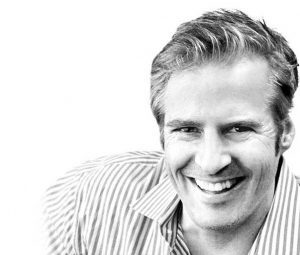 Oren Klaff is Director of Capital Markets at investment bank Intersection Capital where he manages its capital raising platform (retail and wholesale distribution), business and product development. Oren co-developed and oversees Intersection Capital’s flagship product, Velocity™. From 2003-2008 as he applied his pioneering approaches to raising capital and incorporating neuroscience into the capital markets programs, Oren raised over $400 million of investor capital from high net-worth individuals and financial institutions. Oren is a member of Geyser Holding’s investment committee where he has been a principal since 2006. During its growth he was responsible for sales, marketing, branding, product development, and business development. Previously, he was a venture analyst and partner at several mid-sized investment funds.
Oren Klaff is Director of Capital Markets at investment bank Intersection Capital where he manages its capital raising platform (retail and wholesale distribution), business and product development. Oren co-developed and oversees Intersection Capital’s flagship product, Velocity™. From 2003-2008 as he applied his pioneering approaches to raising capital and incorporating neuroscience into the capital markets programs, Oren raised over $400 million of investor capital from high net-worth individuals and financial institutions. Oren is a member of Geyser Holding’s investment committee where he has been a principal since 2006. During its growth he was responsible for sales, marketing, branding, product development, and business development. Previously, he was a venture analyst and partner at several mid-sized investment funds.
Key Conversation Points
Following social guidelines when certain interactions are challenging
Social intuition versus social engineering
Discovering the blueprint for converting introverted to extroverted behaviors when you need to “turn it on”
Using social engineering guidelines to your advantage
How to establish high status and confidence in business
Making the most efficient use of everyone’s time
How to attract a buyer to what you have instead of selling it to them
How to make all areas of your client’s brain receptive
Leading in with a “big idea”
Resources Mentioned in the Podcast*
Pitch Anything: An Innovative Method for Presenting, Persuading, and Winning the Deal | Oren Klaff
David JP Fisher’s podcast Beer, Beats and Business
The Introvert Entrepreneur Mastermind Group Survey (anonymous and short!)
More of Beth’s favorite sales/marketing books:
Insight Selling | Mike Schultz and John E. Doerr
To Sell is Human | Dan Pink
Made to Stick | Chip Heath and Dan Heath
Connect with Oren
Sharing is Caring!
How to use arrogance to your advantage. #Podcast via @IntrovertCoach @pitchanything
How understanding your “primal brain” can help you do better #business. #Podcast via @IntrovertCoach @pitchanything
If You Enjoyed the Show
You can subscribe to The Introvert Entrepreneur Podcast on on iTunes or Stitcher. Please leave an honest review on iTunes or Stitcher. If you want to hear more news from The Introvert Entrepreneur including and beyond the podcasts, join the enewsletter mailing list.
*Amazon links are affiliate, meaning I receive a few pennies when you purchase through my link. You get some retail therapy, I get additional resources to keep bringing you great podcasts. Win-Win!!
The post Ep116: Oren Klaff Tells Us How to Pitch Anything appeared first on The Introvert Entrepreneur.
May 5, 2016
The Life-Changing Magic of Launching a Minimum Viable Product (Blogcast #8)

Did you know you could listen to this post? Scroll to the bottom for the audio version!
This is a minimum viable blog post.
What makes it so? Because it’s a version of new content which allows me to collect the maximum amount of validated learning about customers with the least effort. (definition adapted from this post: http://www.startuplessonslearned.com/2009/08/minimum-viable-product-guide.html)
In other words, I’m trying to provide value to my reader, expending minimum effort on my part with the intention of starting a feedback loop and continuing to develop my ideas.
This post will contain the basics of what I know, without going into lots of detail and trying to have all of the bells and whistles it could have if I was really going to go all-out. It’s stripped down to a core essence. It’s not my final word on the matter, but it starts the conversation.
The term “Minimal Viable Product,” or MVP, has been around since 2001, most recently associated with Lean Startup business frameworks. Eric Ries is one of the people who popularized the term, and he gives us the full breakdown in his book, The Lean Startup. It’s about continuous innovation, which can only happen if you’re getting products and services out the door.
And that’s where a lot of us get stuck. We get the big idea, but we don’t execute on that idea. Or we stay in a beta or testing phase for too long and lose our momentum and even our interest. And of course, what often gets in the way of execution is the biggest bugaboo of them all: perfectionism.
I found myself wrestling with perfectionism for the past six months or so as I worked to develop an online course offering based on my new book, “The Introvert Entrepreneur.” In fact, it had been an idea since the book’s inception. That means it had been in the back of my mind for at least three years, then moved to the front of my mind over the past two as the book’s publication date came closer. Well, the pub date came and went, and I was stuck. I had an outstanding instructional designer assisting me, but I was still stuck as stuck could get.
So I did what I do these days: I took my stuckness to my mastermind group. These are five of the smartest people I know, and I had a strong hunch they’d have good feedback and questions for me. My hunch proved to be beyond right. As I shared my vision for the online course, one of my colleagues started talking about taking a step back and re-evaluating what I was envisioning. What was the purpose of the course? What did I want to accomplish?
What could be the minimum viable product that could be put out there just to get it moving?
It was that last question that had the life-changing magic effect. I literally teared up – okay, I actually cried a bit – and felt very emotional as he was talking. I felt a huge weight lift off my shoulders. I’d been so attached for so long to the product looking a particular way, I forgot I had choices.
With the group’s help, I re-imagined the online course as a virtual book group. Within 24 hours, I’d posted a promotional page on my website and started sharing the news on social media. And three weeks later, I hosted the first call with one of two virtual book groups that had formed.
After years of being attached to a specific vision, I was able to release it in 24 hours and make something happen.
A minimum viable product…
It’s not about putting out something that’s sub-par and not ready for prime time. It’s about having just enough functionality and value that you can test the market and begin data collection. And that’s so much better than investing enormous amounts of time, money and energy on something that’s beautiful when it launches, but still has bugs AND it turns out there’s not much interest.
As I move forward with these book groups, there’s a bit of “build the plane while you’re flying it” going on behind the scenes. And that’s totally okay. I trust myself enough to know I can handle that. In fact, there’s something liberating about it because I know I’m building a plane people want to fly in, because I’m getting feedback and implementing that feedback as I go.
If you’re finding yourself with a bunch of half-finished ideas or paralyzed by one big idea that doesn’t seem to make progress, here are some steps to help you move to an MVP approach.
Notice what you’re attached to.
Reflect on all aspects of your product. Does it have to serve 1,000 people? Does it need to have an app, a podcast, its own logo, at launch time? Does it need to make $x in its first week? It’s great to begin with the end in mind, but don’t get caught up in thinking that the beginning has to look like the end. If you find yourself saying, “have to,” “need,” “should,” or “must,” that’s an indicator there’s attachment to something. Question if those “have to” points are really true.
Whatever the attachment is, let it go.
Really. Let it go. Release it in service of making space for other possibilities. It doesn’t mean those things won’t come up again or ultimately prove important, but in the interest of moving forward, let it go.
Drill down to the essence.
This was an important part of my ability to make the shift from full-blown online course with lots of moving parts to a simplified virtual book group offering. When I thought about the bottom line of what I wanted to accomplish, it was to, as I shared with the publisher when I pitched the book, to make the book a living, breathing thing. I wanted people to read and take action, read and discuss. And oddly, being that most of my readers are introverts, I wanted them to do it in community, because even introverts can feel isolated and need more interaction than we get when we have our heads down and are focused on our business.
Because I’d always envisioned this online course, I forgot there were multiple ways to achieve the essence of my goal: to connect people through the book and provide a space for them to discuss and take action to improve their business. A virtual book group does that, and then some. The online course is still on the agenda, but now I’ve begun an evolutionary process, and the online course will grow out of the book group. This saves me energy and keeps me moving forward.
Imagine a “lite” version.
Take your project, offering, or product, and imagine it at maybe 50%. What are the core elements that would need to be retained in order for it to be viable? Are there “nice to haves” that can be put on the back burner? Be really honest with yourself (it’s just like writing – your favorite turn of phrase might be exactly the one that needs to be cut) about what stays and what goes. Put yourself in the mind and heart of your customer, and focus on what would serve them best, rather than what would serve your ego (ouch! I know… but we have to acknowledge that that’s what trips us up at times!)
Lead with curiosity.
Now that you’ve identified the MVP, continue to notice any attachments, let them go, and lead with curiosity. In some respects, you’re staying in research and development mode. While you launch with the intention that it’s a viable product, there’s a chance it won’t be. It might be rougher – or more ready – than you thought. The only way you’ll find out is if you stay curious and always be asking why different aspects are and aren’t working.
Embrace the feedback loop.
This is what makes an MVP so valuable. If you lead with curiosity, you’re going to create a strong feedback loop. Most often, the people who purchase an MVP are early adopters. They aren’t terribly surprised by bugs and glitches, because they know they’re getting a first generation product. That said, they’re not shy with feedback. You’ll hear the good and the bad. Take it all in, knowing it’s part of an evolutionary process and creating something new.
Keep improving.
From my perspective, one of the benefits of an MVP is that you get a chance to fail fast so that you can improve more quickly and efficiently. This is not to say that your MVP is destined to fail. But it does mean that failure is always an option when it comes to launching something new into the market. The failure in this case will be smaller and of less consequence, because you’ve invested minimal effort to receive maximum feedback. Resilience builds when we’re able to recover from small set-backs and learn to trust we can handle them and keep improving, keep innovating.
One of my best friends is going to laugh when she reads this post, because when I said I was going to write a minimal viable blogpost, we both thought it would be a few hundred words and out. And as I type, I’m watching the word count pass 1,500 and continue to climb.
Despite that higher number, I still consider this to be an MVP blogpost. It’s just enough information to bring value to your business (I hope) and only took about an hour of my time. Of course, I’ve spent several hours off and on over the past few days thinking about it, but the burst of energy required to move it from my head to my laptop was short and enjoyable.
It’s a reminder that what’s an MVP to me will probably not be the same as an MVP to you. You have to use your best judgment. You know how much further you could go and where you’re drawing the line. And now that I’ve passed 1,600 words, I do think it’s time to bring this post to a close.
Here’s to moving past perfectionism, inertia, and attachment through the life-changing magic of minimum viable products!
Listen to this post:
The post The Life-Changing Magic of Launching a Minimum Viable Product (Blogcast #8) appeared first on The Introvert Entrepreneur.



